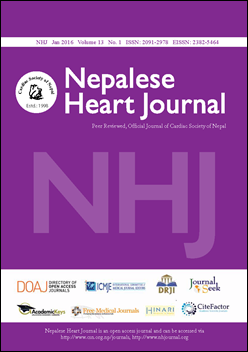Outcome of pregnancies in women with prosthetic mechanical heart valves
DOI:
https://doi.org/10.3126/njh.v13i1.14537Keywords:
Low Molecular Weight Heparin, Mechanical Heart Valve, Pregnancy, WarfarinAbstract
Background and Aims: Rheumatic heart disease is still prevalent in Nepal. Many young women had to undergo cardiac surgery before or at their childbearing age. Due to teratogenic effect and maternal risk, pregnancy is generally not advised to those women who are under oral anticoagulant for prosthetic mechanical heart valves. We aim to evaluate the pregnancy outcome and thromboembolic events during pregnancy in patients with mechanical heart valves.
Methods: This was a prospective, descriptive study conducted at the department of Obstetrics and Gynaecology of Tribhuvan University Teaching Hospital from January 2012 to June 2015. All the pregnant patients with mechanical heart valves who attended our antenatal clinic were included in this study.
Results: Eighteen women attended our antenatal clinic at different gestational age. Among them fifteen women arrived early and took LMWH in first trimester as well after 36 weeks or before delivery. Three women attended antenatal clinic after the first trimester and took LMWH only in third trimester before delivery. In those patients who took LMWH at first trimester, all had favorable outcome except one. In those women who continued oral anticoagulants in first trimester one had intrauterine fetal death.
Conclusion: : Our study suggests that pregnancies in prosthetic mechanical heart valves women have a favorable outcome even in the low-resource country like Nepal.
Nepalese Heart Journal 2016; 13(1): 5-7
Downloads
Downloads
Published
How to Cite
Issue
Section
License
This license enables reusers to distribute, remix, adapt, and build upon the material in any medium or format, so long as attribution is given to the creator. The license allows for commercial use.




